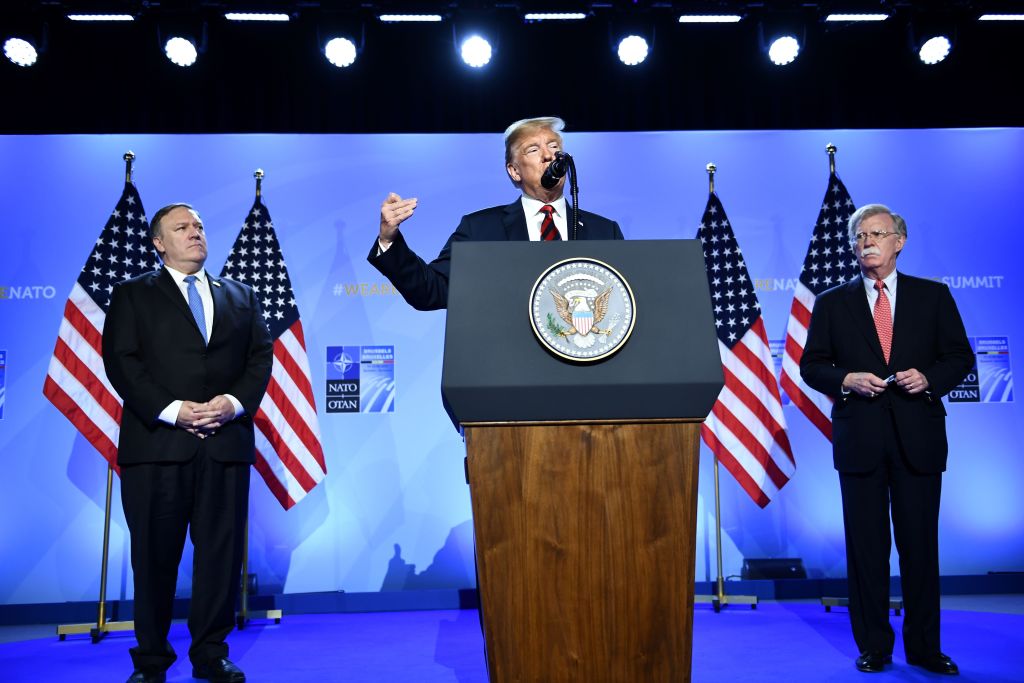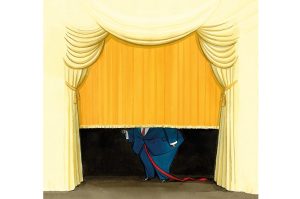When it comes to war, does the president have too much authority?
The Framers of the US Constitution had a rather dark view of human nature and went to great lengths to restrain, divide, and decentralize power. In particular, they believed that it was in the nature of executive power to be unduly prone to war. For this reason, they very deliberately placed the power to take the country to war in the Congress. At the Constitutional Convention James Wilson argued, ‘This system will not hurry us into war; it is calculated to guard against it.’
Yet the presidency has over the years gathered more and more of the war powers unto itself, and at present intense political conflict is tearing at the fabric of the Constitution. As the momentous possibility of conflict with Iran is being considered you have to wonder whether the old checks and balances of the Constitution still have any efficacy.
Granted that the Executive’s expanded role in foreign policy violates the text of the Constitution, could it be argued that the presidency, while adapting to changed historical circumstances, remains faithful to the spirit of the Constitution? The present moment affords an opportunity to test this proposition. The reason is that American conservatives have long viewed themselves as strong defenders of the Constitution and that putative conservatives are now in charge of US foreign policy. A comparison between them and the Framers will help assess the state of American constitutionalism.
The Framers’ effort to tame power was not merely a matter of making ingenious institutional-procedural arrangements. Their notion of what structures would increase the likelihood of good government grew out of a view of human nature. They believed that humans have a potential for nobility and wisdom, but that these are forever threatened by traits like ruthlessness, greed, ignorance, and, above all, an excessive desire for power. The Constitution was intended to bias decision-making in favor of man’s better angels.
The institutional checks would ultimately fail without the restraint, integrity, and high-mindedness that could come only from within the political actors: from moral character, circumspection, knowledge, respect for the truth, modesty, and from a recognition that in politics no side has a monopoly on right. People of statesmanlike qualities concerned about the common good had to check partisan demagogues and bullies.
The Constitution thus had to be made efficacious by people capable of acting in its spirit. They would have to be temperamentally predisposed to self-control and long views — exhibit what we may call the constitutional personality. Without it, even the best-designed procedural checks would become hollow.
The Constitution assumes that decisions are best made in an atmosphere of calm deliberation. Popular representatives of broad views and critical detachment from the passions of the moment should set the tone. The American constitutional tradition disdains making important decisions when emotions run hot. It favors the more slowly emerging ‘deliberate sense’ of the people. The task of popular representatives is, as Madison wrote in Federalist 10, to ‘refine and enlarge the public views.’ The Constitution puts a premium on defusing conflict, deliberating, compromising, and respecting the minority.
To contemplate the personality traits that the Framers hoped would animate the Constitution is to become aware how different they are from traits prominent among those now in charge of US foreign policy. In the latter group, you find a strong preference for assertive, hawkish, unilateral application of superior power. The preferred method of dealing with recalcitrant states is confrontation, saber-rattling, and other harsh, unrelenting pressure — not negotiation, compromise, and openness to the possibly legitimate interests of opponents, as if only the US had such interests.
Secretary of state Mike Pompeo and others on President Trump’s foreign policy team have revived the ‘neoconservative’ ideas that helped get the US into war with Iraq. We are again told that the US is morally and politically unique, based on universally applicable principles that make America the obvious and indispensable leader of the forces of freedom. Good stands against evil in the world. On July 8, in a speech to a convention of Christians United for Israel Pompeo said that America ‘is given to defend the spiritual values — the moral code — against the vast forces of evil that seek to destroy them.’
In a speech in June, at the Claremont Institute in California, Pompeo had reminded us that America is ‘exceptional…a place and history apart from normal human experience.’ By virtue of its noble global mission America is entitled to dictate terms to a rogue power like Iran and confront countries like China and Russia that are ‘intent on eroding American power.’ Should this reasoning appear conceited and a recipe for conflict, understand that, according to Pompeo, ‘conflict is the normative experience for nations.’
President Trump recently ‘joked’ that if his national security adviser John Bolton had had his way ‘we’d be in four wars by now.’
In a speech at the recent West Point graduation ceremony, Vice President Mike Pence made the military implications of the Pompeo-Bolton view of America’s role in the world explicit. He told the cadets to put their ‘armor’ on for conflict so that ‘when — not if – that day comes, you’ll be able to stand your ground.’ They had to be ready to counter an ‘aggressive’ country like Russia that is trying to ‘redraw international boundaries by force.’ Not to worry, Pence said, ‘you will fight and you will win.’
In the Congress, the same confrontational attitude is represented by reputed conservatives like the always bellicose Sen. Lindsay Graham and his colleague Tom Cotton, who is challenging Graham for the role of uberhawk. The latter recently argued that the president or even ‘battalion commanders’ should be able to decide whether to attack Iran.
These allegedly conservative sentiments indicate that at least when it comes to foreign policy and war the president should not be subjected to the kind of checks that, according to the Framers, needed to be placed on all power. Why, indeed, should a force for good in the world be restrained?
It should be evident that if devotion to the Constitution is a prominent feature of American conservatism, the appetite for unrestricted executive power in foreign policy represents something very different. Conservatism has somehow been turned on its head. Self-importance rather than modesty, confronting opponents rather than defusing conflict, dictating terms rather than compromising — these contrast sharply with the spirit of American constitutionalism. They also do not accord with Donald Trump’s promises during his election campaign.
The constitutional personality is in short supply in today’s America. Among those now setting the tone in foreign-policy it is often positively scorned.
Claes G. Ryn is Professor of Politics and Founding Director of the Center for the Study of Statesmanship at the Catholic University of America in Washington, D.C. and the author ofAmerica the Virtuous and A Common Human Ground: Universality and Particularity in a Multicultural World.


















